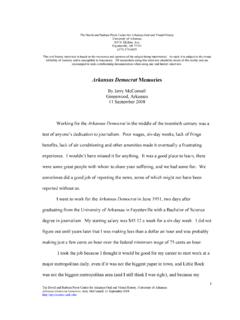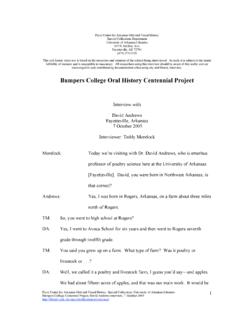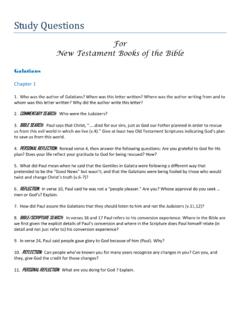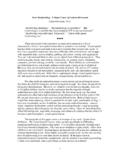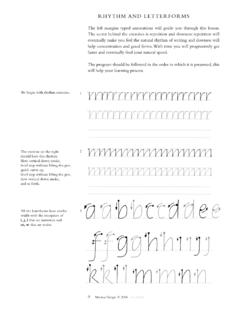Transcription of Diane D. Blair Papers (MC 1632) - pryorcenter.uark.edu
1 Special Collections University of Arkansas Libraries 365 N. McIlroy Avenue Fayetteville, AR 72701-4002 (479) 575-8444 Diane D. Blair Papers (MC 1632) 1992 Clinton Presidential Campaign Interviews Interview with Adam M. Samaha Campaign Position: Research Assistant Little Rock, Arkansas November 3, 1992 Overview Diane D. Blair was an assistant professor of political science at the University of Arkansas, Fayetteville, when she took a leave of absence to serve as a senior researcher in Governor Bill Clinton s presidential campaign. Approximately one month before the November election, Blair obtained permission from the governor to conduct interviews with participants in the Clinton/Gore campaign. In her own words, .. I had two major purposes in mind: first, simply to preserve for posterity an accomplished campaign organization that would essentially disappear on election day; and second, through discussions with campaign workers from all departments, to see what those on the inside believed to be the key ingredients of the campaign s success.
2 She prepared a list of questions and began interviewing people as schedules allowed. After Blair s death in 2000, her husband, Jim Blair , donated her personal and professional Papers to Special Collections, University of Arkansas Libraries. Adam M. Samaha reviewed this transcript and granted permission to make this interview available to scholars, students, and researchers. The final document may contain edits requested by the interviewee. This transcript was processed as part of the Diane D. Blair Papers and prepared for publication by the editorial staff of the David and Barbara Pryor Center for Arkansas Oral and Visual History. The Diane D. Blair Papers are housed in Special Collections, University of Arkansas Libraries, Fayetteville. Permission to republish or quote from this interview must be obtained before publication. Please contact Special Collections at (479) 575-8444 or for assistance.
3 A Permission to Publish Request Form may found at Interview with Adam Samaha, November 3, 1992 2 Diane D. Blair Papers (MC 1632) Special Collections, University of Arkansas Libraries, Fayetteville [Beginning of Interview] Diane Blair : What were you doing immediately before you came with the campaign? Adam Samaha: I had just graduated from college, and I spent about a week or a week and a half at home going crazy, and then just came down to Little Rock. I d met a couple of people on the campaign from when I was in New Hampshire, and I called and said, Give me some advice like who would want to hire somebody? They said the research department might be one place. So, I sent in a resume to Betsey and a couple of weeks later I was down in Little Rock. DB: Can you give a brief description of your responsibilities? AS: Not really, not briefly. A lot of things. When I first got here it was basically going through the governor s Papers , just box after box after box.
4 DB: Looking for? AS: Well, at first it was a very limited search, and then by the end it was anything good. Anything that was useful, anything positive written to the governor from a Republican, anything the governor wrote to a federal agency, any kind of correspondence like that even campaign brochures. Basically anything that might be of use. And that, I will say, was a real at least speaking for Steve and myself really, it was pretty incredible. Even just to see what you knew was the governor s handwriting and Hillary s handwriting on something. Even if it seemed far removed from the speeches he was giving out on the road. Even so, these were real live documents. And I was a history and government major in Interview with Adam Samaha, November 3, 1992 3 Diane D. Blair Papers (MC 1632) Special Collections, University of Arkansas Libraries, Fayetteville college and I wrote my senior thesis in history, and that s why those documents were so interesting.
5 They were real things that people left behind and that was a real thrill, even though it seemed like the most horrible endless task. It was tremendous. That was a real honor and I felt that we were really being trusted with something. And we tried to treat it with as much respect as we could. DB: And what else have you done? AS: Well, we went to the convention in New York and basically just watched all the speeches. After that, things got a lot more hectic and it was more job-to-job, as I remember. A lot of it s really kind of a blur. A lot of it was very technical work. And the most important thing, though, was to stay organized. And it seemed like sometimes people would be underorganized and it s better to keep yourself overorganized to compensate, so nothing falls through the cracks. That was a big thing. And just doing small research tasks. Find this. What s the number on this. What s a short, brief history of this.
6 So it was a lot of digging. DB: Working up subjects, anticipating criticism AS: Exactly. And trying to keep everything in one place as centralized as possible. DB: And then you went to another convention. AS: And then I went to another convention, the Republican. And basically that was, for some reason, not the horror show that I thought it might be. And it was largely because I think maybe just the way they formatted their convention did not really merit very much response. It scared people enough, and they didn t really need our help. DB: What scared people? Interview with Adam Samaha, November 3, 1992 4 Diane D. Blair Papers (MC 1632) Special Collections, University of Arkansas Libraries, Fayetteville AS: The right-wing fundamentalism which really is just fundamentalism that I know a lot of northeastern Republicans are very uncomfortable with. I don t know if you want to call them yuppies, but those who have some sort of social liberalism but really are joined to the Republican Party because of the tax issues and finance issues, small government issues.
7 You can t do that. And it really scared people by talking about these religious wars and things like that. And I was there with Betsey and it was much more lighthearted than I expected. I thought it was going to be real Bunkeresque, but it wasn t. We had a good time. It was a lot of work that I never had done before in my life advance work and scheduling and getting phone lines dropped I hadn t even heard that term before I got down there. I hadn t even purchased a plane ticket for myself before. I mean, I know something about computers. I had never used a fax machine maybe once or twice before I got here. And it s about double-checking everything and getting all the right lines. It s really the communications, which you just had to make sure things were integrated and people were in the right place and how you are going to get back and forth with thousands of people jamming the streets for the convention.
8 And it was a test, but I had really good people working around me, and maybe they didn t know what they were doing, but they sure acted like it, and that gave me a lot of confidence. DB: This campaign is now being described as the most effective presidential campaign in recent American history. What, from your perspective, made it so effective? AS: Well, I would say that historical circumstances are more than half of what made this campaign successful. And I don t think that this campaign ever really had to Interview with Adam Samaha, November 3, 1992 5 Diane D. Blair Papers (MC 1632) Special Collections, University of Arkansas Libraries, Fayetteville get tough as tough as I think most people were prepared to get. They really didn t have to do it. Either the way things were, or the way Republicans made them or whatever, but a lot of it was on their doorstep and I think that the Republicans never fully got the ball in our court.
9 They just never did. And we had to hit back and respond, but I think that that was good enough in this campaign. This campaign was not very proactive, but I think that that was good enough for this campaign because the fundamentals the talking heads say the fundamentals were with the Democrats. I don t feel like it ever really got that tough. I mean, I know about losing campaigns. DB: Well, you re a Democrat. AS: Exactly. And a Cubs fan. But I think that the most effective thing was almost the overreaction to every little try not to let anything get by. Even if responses just sort of went down a dark hole and no one would ever print them. It was just the vigilance that everybody felt. DB: From your perspective, how did this organization work? AS: I think it was the strength of the individuals. Another way to describe it, I think that there were a lot of incredibly capable people, not necessarily efficiently organized, but that organization I think is supposed to be something of necessity.
10 It s not supposed to be just a format, and so when you re under a lot of pressure and there s a necessity to organize, you organize. And I think that the organization just came through in the panic. Maybe just winging it by the seat of your pants, but I think that it really is a lot of very intelligent people who are Interview with Adam Samaha, November 3, 1992 6 Diane D. Blair Papers (MC 1632) Special Collections, University of Arkansas Libraries, Fayetteville incredible individuals. I don t know why things weren t sort of lockstep organized, but I think that that allowed for a lot of flexibility at the same time, too DB: What, from your standpoint, was the low point in the campaign? AS: The low point in the campaign was probably sometime around when I got here. It wasn t a low point for me personally, but Bill Clinton was in third place. I came, I think, June 15. And we were running third and nothing much happening.






